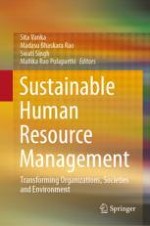2020 | OriginalPaper | Chapter
10. Culture, Climate and Sustainability in Organizations
Authors : Vinitha Nair, Veena Vohra
Published in: Sustainable Human Resource Management
Publisher: Springer Singapore
Activate our intelligent search to find suitable subject content or patents.
Select sections of text to find matching patents with Artificial Intelligence. powered by
Select sections of text to find additional relevant content using AI-assisted search. powered by
